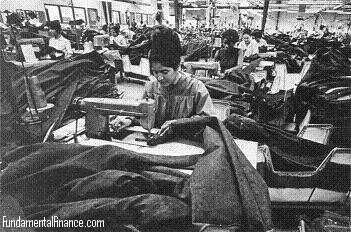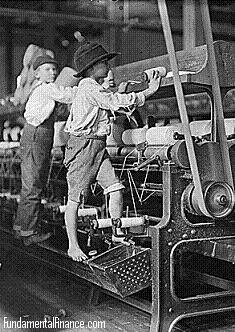Sweatshops and Child Labor
Sweatshops and child labor are often cited when groups call for boycotts of businesses and trade sanctions against third world nations. Protesters assemble and debates regarding labor standards frequently emerge in news headlines. Although sweatshops and child labor are undesirable, they are a necessary step in each nation's development towards human rights and a developed economy and there are methods superior to boycotts to help other nations develop decent labor laws.
 In no way do I wish to detract from the awful conditions that occur in sweatshops. People are often required to work long days in physically and mentally harsh conditions for extremely low wages. Children are even sometimes put to work in dangerous conditions that I would not wish on any child. So-called "watchdog groups" and "human rights advocates" will frequently cite examples of the harsh conditions that exist in sweatshops to push their agendas calling for boycotts of products and companies or restrictions on trade with nations that don't have or enforce laws inhibiting sweatshops. Their solution is to oppose sweatshop-produced products until the producers conform to regulations similar to those in Western nations like the United States. This is the incorrect solution to the problem and will not only leave the problem unsolved but also make citizens of sweatshop strewn nations worse off.
In no way do I wish to detract from the awful conditions that occur in sweatshops. People are often required to work long days in physically and mentally harsh conditions for extremely low wages. Children are even sometimes put to work in dangerous conditions that I would not wish on any child. So-called "watchdog groups" and "human rights advocates" will frequently cite examples of the harsh conditions that exist in sweatshops to push their agendas calling for boycotts of products and companies or restrictions on trade with nations that don't have or enforce laws inhibiting sweatshops. Their solution is to oppose sweatshop-produced products until the producers conform to regulations similar to those in Western nations like the United States. This is the incorrect solution to the problem and will not only leave the problem unsolved but also make citizens of sweatshop strewn nations worse off.
People that work in sweatshops are in a terrible situation. They most likely are not educated, they come from a poor family in a poor nation, and they have few skills that can help them provide for a family. They most likely have poor sanitation and health standards. If they have employment options, none of them are good; however, if they are choosing to work at a sweatshop, then we know that it is their best option, given their circumstances. Notice I said "best" option and not "good" option. If someone works at a sweatshop then we know that it is the best way they have to provide for their family. If the sweatshop they work at is closed down, then they will be forced to choose a worse place of employment. This means that boycotting a sweatshop will harm its workers.
 It would be nice if we could simply wave a magic wand and have all sweatshops and child labor evolve to respectable companies with benefits like we have in the United States. What people often forget is that the United States has its own history with sweatshops. In the early 1800's, children ages 7 to 12 made up one-third of the work force in U.S. factories. In 1836 Massachusetts, worried about child illiteracy, adopted a law prohibiting the employment of a child under 15 who hadn't received at least three months of schooling in the previous year; it was the first law of its kind. By the mid 1850's, several states had adopted laws regulating the hours children under 12 could work (most could only work 10 hours!). Nevertheless, child labor continued to gain popularity and at the turn of the 19th century one fifth of all children ages 10-16 were employed. At the same time sweatshops formed the bulk of the garment industry and other industries. Starting in 1916, several laws were passed by the US Congress to set standards for child labor (like a minimum age limit of 14 in certain industries), but laws passed by Congress were repetitively struck down by the Supreme Court because they infringed on personal freedom. A constitutional amendment was attempted in 1924 to allow Congress to regulate labor for people under 18 but it wasn't ratified by enough states. Finally in 1938 the Fair Labor Standards Act was passed by Congress and later upheld by the Supreme Court [1].
It would be nice if we could simply wave a magic wand and have all sweatshops and child labor evolve to respectable companies with benefits like we have in the United States. What people often forget is that the United States has its own history with sweatshops. In the early 1800's, children ages 7 to 12 made up one-third of the work force in U.S. factories. In 1836 Massachusetts, worried about child illiteracy, adopted a law prohibiting the employment of a child under 15 who hadn't received at least three months of schooling in the previous year; it was the first law of its kind. By the mid 1850's, several states had adopted laws regulating the hours children under 12 could work (most could only work 10 hours!). Nevertheless, child labor continued to gain popularity and at the turn of the 19th century one fifth of all children ages 10-16 were employed. At the same time sweatshops formed the bulk of the garment industry and other industries. Starting in 1916, several laws were passed by the US Congress to set standards for child labor (like a minimum age limit of 14 in certain industries), but laws passed by Congress were repetitively struck down by the Supreme Court because they infringed on personal freedom. A constitutional amendment was attempted in 1924 to allow Congress to regulate labor for people under 18 but it wasn't ratified by enough states. Finally in 1938 the Fair Labor Standards Act was passed by Congress and later upheld by the Supreme Court [1].
 If the United States and other Western nations needed a century to emerge from using sweatshops and child labor, how can we expect third world nations to do the same in less time? Many of the countries that still have sweatshops today didn't have much industry until about a century after we developed ours. This puts them on a timetable that's still a few decades from decent labor laws. It's true that they have our example before them, but we must help them in more effective ways than boycotts and protests.
If the United States and other Western nations needed a century to emerge from using sweatshops and child labor, how can we expect third world nations to do the same in less time? Many of the countries that still have sweatshops today didn't have much industry until about a century after we developed ours. This puts them on a timetable that's still a few decades from decent labor laws. It's true that they have our example before them, but we must help them in more effective ways than boycotts and protests.
First of all, countries with corrupt, non-democratic governments are going to have a hard time shaking off their sweatshops. If people working in the sweatshops have no power to lobby the government (by voting for representatives, for example), then their government will want to continue to attract foreign investment in sweatshops without requiring better working conditions. Watchdog groups could use their time more wisely by promoting good, democratic governments. Secondly, if we want to improve the situation of people in sweatshop nations we should support free trade and buy products that are produced in sweatshops. That may sound ludicrous (and maybe it is), but as I pointed out before, a worker will only work in a sweatshop if it makes him better off. Purchasing items produced in sweatshops will also increase demand for investment in sweatshop nations which will gradually make the nations more wealthy and give them the ability to make changes. If uncorrupt governments are in place, then the changes will come even more quickly. Finally, we must remember that it will take baby steps. Nations cannot change overnight, it's a process that will take some time.
I would again like to emphasize that I do not wish a sweatshop on anyone, especially not a child. Nevertheless, I think a more logical veiw must be taken by the first world public if we want to make changes in third world countries.
[1] "Child Labor," Microsoft(R) Encarta(R) 97 Encyclopedia. (c) 1993-1996 Microsoft Corporation. All rights reserved.
|
|